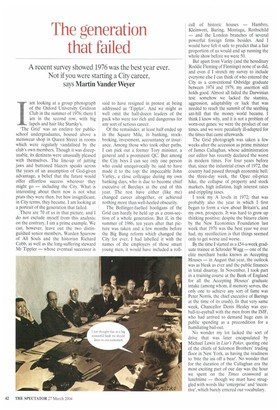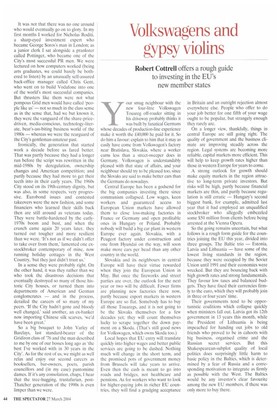The generation that failed
A recent survey showed 1976 was the best year ever. Not if you were starting a City career, says Martin Vander Weyer Iam looking at a group photograph of the Oxford University Gridiron Club in the summer of 1976; there I am in the second row, with big lapels and hair like Starsky's. 'The Grid' was an enclave for publicschool undergraduates, housed above a menswear shop in Queen Street in rooms which were regularly vandalised by the club's own members. Though it was disreputable, its denizens were unusually pleased with themselves. The line-up of jutting jaws and buttoned blazers speaks across the years of an assumption of God-given advantage, a belief that the future would offer effortless success wherever they might go — including the City. What is interesting about them now is not what prats they were then, but how insignificant. in City terms, they became. I am looking at a portrait of the generation that failed.
There are 70 of us in that picture, and I do not exclude myself from this analysis; on the contrary, I am a prime example. We can, however, leave out the two distinguished senior members, Warden Sparrow of All Souls and the historian Richard Cobb, as well as the long-suffering steward Mr Tippler — whose eventual successor is said to have resigned in protest at being addressed as 'Tippler'. And we might as well omit the half-dozen leaders of the pack who were too rich and dangerous for any sort of serious career.
Of the remainder, at least half ended up in the Square Mile, in banking, stockbroking, investment, accountancy or insurance. Among those who took other paths, I can pick out a former Tory minister, a general and a prominent QC. But among the City boys I can see only one person who could unequivocally be said to have made it to the top: the impeccable John Varley, a close colleague during my own banking days, who is due to become chief executive of Barclays at the end of this year. The rest have either (like me) changed career altogether, or achieved nothing more than well-heeled obscurity.
The Bollinger-fuelled hooligans of the Grid can hardly be held up as a cross-section of a whole generation. But if, in the summer of 1986, ten years after that picture was taken and a few months before the Big Bang reform which changed the City for ever, I had labelled it with the names of the employers of those smart young men, it would have included a roll
call of historic houses — Hambro, Kleinwort, Baring, Montagu, Rothschild — and the London branches of several powerful foreign firms besides. And I would have felt it safe to predict that a fair proportion of us would end up running the whole show before we were 50.
But apart from Varley (and the hereditary Roddie Fleming of Flemings) none of us did, and even if I stretch my survey to include everyone else I can think of who entered the City as a conventional Oxbridge graduate between 1974 and 1979, my assertion still holds good. Almost all failed the Darwinian test: somehow we lacked the stamina, aggression, adaptability or luck that was needed to reach the summit of the seething ant-hill that the money world became. I think I know why, and it is not a problem of worn-out genes: we were the product of our times, and we were peculiarly ill-adapted for the times that came afterwards.
The Grid photograph was taken a few weeks after the accession as prime minister of James Callaghan, whose administration our editor has recently declared the worst in modern times. For four years before that, since the industrial crises of 1972, the country had passed through economic hell: the three-day week, the Opec oil-price hike, the collapse of property and stock markets, high inflation, high interest rates and crippling taxes.
I took my A levels in 1972; that was probably also the year in which I first began to form a view about Britain's, and my own, prospects. It was hard to grow up thinking positive; despite the bizarre claim by the New Economics Foundation last week that 1976 was the best year we ever had, my recollection is that things seemed only to get worse and worse.
By the time I started as a £54-a-week graduate trainee at Schroder Wagg — one of the elite merchant banks known as Accepting Houses — in August that year, the outlook was as bleak as ever and the public finances in total disarray. In November, I took part in a training course at the Bank of England for all the Accepting Houses' graduate intake (among whom, if memory serves, the only one to achieve any sort of fame was Peter Norris, the chief executive of Barings at the time of its crash). In that very same week, Chancellor Denis Healey was eyeball-to-eyeball with the men from the IMF, who had arrived to demand huge cuts in public spending as a precondition for a humiliating bail-out.
No wonder my lot lacked the sort of drive that was later encapsulated by Michael Lewis in Liar's Poker, quoting one of the chiefs of Salomon Brothers' trading floor in New York, as having the readiness to `bite the ass off a bear'. No wonder that for the duration of the Callaghan era the most exciting part of our day was the hour we spent on the Times crossword at lunchtime — though we must have struggled with words like 'enterprise' and 'incentive', which barely entered our vocabulary.
It was not that there was no one around who would eventually go on to glory. In my first months I worked for Nicholas Roditi, a sharp-eyed investment expert who became George Soros's man in London; as a junior clerk I sat alongside a prankster called Pottinger, who became one of the City's most successful PR men. We were lectured on how computers worked (being arts graduates, we could barely be bothered to listen) by an unusually self-assured back-office manager called Chris Gent, who went on to build Vodafone into one of the world's most successful companies. But thrusters like them were not what pompous Grid men would have called 'people like us' — not so much in the class sense as in the sense that, had we but known it, they were the vanguard of the share-pricedriven, media-conscious, technology-literate, bear's-ass-biting business world of the 1980s — whereas we were the rearguard of the City's gentleman-amateur past.
Ironically, the generation that started work a decade before us fared better. That was partly because they had a longer run before the script was rewritten in the mid-1980s by deregulation, ownership changes and American competition; and partly because they had more to get their teeth into in their early years. The 1960s City stood on its 19th-century dignity, but was also, in some respects, very progressive. Eurobond issues and contested takeovers were the new fashion, and some financiers who learned their skills back then are still around as veterans today. They were battle-hardened by the early1970s boom and bust, and when the crunch came again 20 years later, they turned out tougher and more resilient than we were. 'It's not as if we didn't offer to take over from them,' lamented one exstockbroker contemporary of mine, now running holiday cottages in the West Country, 'but they just didn't trust us.'
In a sense they were probably right. On the other hand, it was they rather than we who took the disastrous decisions that eventually destroyed so many of those historic City houses, or turned them into departments of American and German conglomerates — and in the process, derailed the careers of so many of my peers. 'If the City hadn't gone and bloody well changed,' said another, an ex-banker now importing Chinese silk scarves, 'we'd have been great.'
So a big bouquet to John Varley of Barclays, last standard-bearer of the Gridiron class of '76 and the man described to me by one of our bosses long ago as 'the best I've worked with in 30 years in the City'. As for the rest of us, we might as well relax and enjoy our second careers as booksellers, bar-owners, poets, parish councillors and (in my case) pantomime dames. If it's any consolation, chaps, I hear that the tree-hugging, trustafarian, postThatcher generation of the 1990s is even limper than we were.



























































































 Previous page
Previous page